- Home
- Virginia Woolf
To The Lighthouse Page 8
To The Lighthouse Read online
Page 8
composure, slightly pursing her lips and, without being aware of it, so
stiffened and composed the lines of her face in a habit of sternness
that when her husband passed, though he was chuckling at the thought
that Hume, the philosopher, grown enormously fat, had stuck in a bog,
he could not help noting, as he passed, the sternness at the heart of
her beauty. It saddened him, and her remoteness pained him, and he
felt, as he passed, that he could not protect her, and, when he reached
the hedge, he was sad. He could do nothing to help her. He must stand
by and watch her. Indeed, the infernal truth was, he made things worse
for her. He was irritable--he was touchy. He had lost his temper over
the Lighthouse. He looked into the hedge, into its intricacy, its
darkness.
Always, Mrs Ramsay felt, one helped oneself out of solitude reluctantly
by laying hold of some little odd or end, some sound, some sight. She
listened, but it was all very still; cricket was over; the children
were in their baths; there was only the sound of the sea. She stopped
knitting; she held the long reddish-brown stocking dangling in her
hands a moment. She saw the light again. With some irony in her
interrogation, for when one woke at all, one's relations changed, she
looked at the steady light, the pitiless, the remorseless, which was so
much her, yet so little her, which had her at its beck and call (she
woke in the night and saw it bent across their bed, stroking the
floor), but for all that she thought, watching it with fascination,
hypnotised, as if it were stroking with its silver fingers some sealed
vessel in her brain whose bursting would flood her with delight, she
had known happiness, exquisite happiness, intense happiness, and it
silvered the rough waves a little more brightly, as daylight faded, and
the blue went out of the sea and it rolled in waves of pure lemon which
curved and swelled and broke upon the beach and the ecstasy burst in
her eyes and waves of pure delight raced over the floor of her mind and
she felt, It is enough! It is enough!
He turned and saw her. Ah! She was lovely, lovelier now than ever he
thought. But he could not speak to her. He could not interrupt her.
He wanted urgently to speak to her now that James was gone and she was
alone at last. But he resolved, no; he would not interrupt her. She
was aloof from him now in her beauty, in her sadness. He would let her
be, and he passed her without a word, though it hurt him that she
should look so distant, and he could not reach her, he could do nothing
to help her. And again he would have passed her without a word had she
not, at that very moment, given him of her own free will what she knew
he would never ask, and called to him and taken the green shawl off the
picture frame, and gone to him. For he wished, she knew, to protect
her.
12
She folded the green shawl about her shoulders. She took his arm. His
beauty was so great, she said, beginning to speak of Kennedy the
gardener, at once he was so awfully handsome, that she couldn't dismiss
him. There was a ladder against the greenhouse, and little lumps of
putty stuck about, for they were beginning to mend the greenhouse.
Yes, but as she strolled along with her husband, she felt that that
particular source of worry had been placed. She had it on the tip of
her tongue to say, as they strolled, "It'll cost fifty pounds," but
instead, for her heart failed her about money, she talked about Jasper
shooting birds, and he said, at once, soothing her instantly, that it
was natural in a boy, and he trusted he would find better ways of
amusing himself before long. Her husband was so sensible, so just.
And so she said, "Yes; all children go through stages," and began
considering the dahlias in the big bed, and wondering what about next
year's flowers, and had he heard the children's nickname for Charles
Tansley, she asked. The atheist, they called him, the little atheist.
"He's not a polished specimen," said Mr Ramsay. "Far from it," said
Mrs Ramsay.
She supposed it was all right leaving him to his own devices, Mrs
Ramsay said, wondering whether it was any use sending down bulbs; did
they plant them? "Oh, he has his dissertation to write," said Mr
Ramsay. She knew all about THAT, said Mrs Ramsay. He talked of
nothing else. It was about the influence of somebody upon something.
"Well, it's all he has to count on," said Mr Ramsay. "Pray Heaven he
won't fall in love with Prue," said Mrs Ramsay. He'd disinherit her if
she married him, said Mr Ramsay. He did not look at the spot about a
foot or so above them. There was no harm in him, he added, and was
just about to say that anyhow he was the only young man in England who
admired his--when he choked it back. He would not bother her again
about his books. These flowers seemed creditable, Mr Ramsay said,
lowering his gaze and noticing something red, something brown. Yes, but
then these she had put in with her own hands, said Mrs Ramsay. The
question was, what happened if she sent bulbs down; did Kennedy plant
them? It was his incurable laziness; she added, moving on. If she
stood over him all day long with a spade in her hand, he did sometimes
do a stroke of work. So they strolled along, towards the red-hot
pokers. "You're teaching your daughters to exaggerate," said Mr
Ramsay, reproving her. Her Aunt Camilla was far worse than she was, Mrs
Ramsay remarked. "Nobody ever held up your Aunt Camilla as a model of
virtue that I'm aware of," said Mr Ramsay. "She was the most beautiful
woman I ever saw," said Mrs Ramsay. "Somebody else was that," said Mr
Ramsay. Prue was going to be far more beautiful than she was, said Mrs
Ramsay. He saw no trace of it, said Mr Ramsay. "Well, then, look
tonight," said Mrs Ramsay. They paused. He wished Andrew could be
induced to work harder. He would lose every chance of a scholarship if
he didn't. "Oh, scholarships!" she said. Mr Ramsay thought her foolish
for saying that, about a serious thing, like a scholarship. He should
be very proud of Andrew if he got a scholarship, he said. She would be
just as proud of him if he didn't, she answered. They disagreed always
about this, but it did not matter. She liked him to believe in
scholarships, and he liked her to be proud of Andrew whatever he did.
Suddenly she remembered those little paths on the edge of the cliffs.
Wasn't it late? she asked. They hadn't come home yet. He flicked his
watch carelessly open. But it was only just past seven. He held his
watch open for a moment, deciding that he would tell her what he had
felt on the terrace. To begin with, it was not reasonable to be so
nervous. Andrew could look after himself. Then, he wanted to tell her
that when he was walking on the terrace just now--here he became
uncomfortable, as if he were breaking into that solitude, that
aloofness, that remoteness of hers... But she pressed him. What had
he wanted to tell her, she asked, thinking it was about going to the
Lighthouse; that he was sorry he had said "Damn you."
But no. He did
not like to see her look so sad, he said. Only wool gathering, she
protested, flushing a little. They both felt uncomfortable, as if they
did not know whether to go on or go back. She had been reading fairy
tales to James, she said. No, they could not share that; they could
not say that.
They had reached the gap between the two clumps of red-hot pokers, and
there was the Lighthouse again, but she would not let herself look at
it. Had she known that he was looking at her, she thought, she would
not have let herself sit there, thinking. She disliked anything that
reminded her that she had been seen sitting thinking. So she looked
over her shoulder, at the town. The lights were rippling and running
as if they were drops of silver water held firm in a wind. And all the
poverty, all the suffering had turned to that, Mrs Ramsay thought. The
lights of the town and of the harbour and of the boats seemed like a
phantom net floating there to mark something which had sunk. Well, if
he could not share her thoughts, Mr Ramsay said to himself, he would be
off, then, on his own. He wanted to go on thinking, telling himself the
story how Hume was stuck in a bog; he wanted to laugh. But first it
was nonsense to be anxious about Andrew. When he was Andrew's age he
used to walk about the country all day long, with nothing but a biscuit
in his pocket and nobody bothered about him, or thought that he had
fallen over a cliff. He said aloud he thought he would be off for a
day's walk if the weather held. He had had about enough of Bankes and
of Carmichael. He would like a little solitude. Yes, she said. It
annoyed him that she did not protest. She knew that he would never do
it. He was too old now to walk all day long with a biscuit in his
pocket. She worried about the boys, but not about him. Years ago,
before he had married, he thought, looking across the bay, as they
stood between the clumps of red-hot pokers, he had walked all day. He
had made a meal off bread and cheese in a public house. He had worked
ten hours at a stretch; an old woman just popped her head in now and
again and saw to the fire. That was the country he liked best, over
there; those sandhills dwindling away into darkness. One could walk
all day without meeting a soul. There was not a house scarcely, not a
single village for miles on end. One could worry things out alone.
There were little sandy beaches where no one had been since the
beginning of time. The seals sat up and looked at you. It sometimes
seemed to him that in a little house out there, alone--he broke off,
sighing. He had no right. The father of eight children--he reminded
himself. And he would have been a beast and a cur to wish a single
thing altered. Andrew would be a better man than he had been. Prue
would be a beauty, her mother said. They would stem the flood a bit.
That was a good bit of work on the whole--his eight children. They
showed he did not damn the poor little universe entirely, for on an
evening like this, he thought, looking at the land dwindling away, the
little island seemed pathetically small, half swallowed up in the sea.
"Poor little place," he murmured with a sigh.
She heard him. He said the most melancholy things, but she noticed
that directly he had said them he always seemed more cheerful than
usual. All this phrase-making was a game, she thought, for if she had
said half what he said, she would have blown her brains out by now.
It annoyed her, this phrase-making, and she said to him, in a matter-
of-fact way, that it was a perfectly lovely evening. And what was he
groaning about, she asked, half laughing, half complaining, for she
guessed what he was thinking--he would have written better books if he
had not married.
He was not complaining, he said. She knew that he did not complain.
She knew that he had nothing whatever to complain of. And he seized
her hand and raised it to his lips and kissed it with an intensity that
brought the tears to her eyes, and quickly he dropped it.
They turned away from the view and began to walk up the path where the
silver-green spear-like plants grew, arm in arm. His arm was almost
like a young man's arm, Mrs Ramsay thought, thin and hard, and she
thought with delight how strong he still was, though he was over sixty,
and how untamed and optimistic, and how strange it was that being
convinced, as he was, of all sorts of horrors, seemed not to depress
him, but to cheer him. Was it not odd, she reflected? Indeed he
seemed to her sometimes made differently from other people, born blind,
deaf, and dumb, to the ordinary things, but to the extraordinary
things, with an eye like an eagle's. His understanding often
astonished her. But did he notice the flowers? No. Did he notice the
view? No. Did he even notice his own daughter's beauty, or whether
there was pudding on his plate or roast beef? He would sit at table
with them like a person in a dream. And his habit of talking aloud, or
saying poetry aloud, was growing on him, she was afraid; for sometimes
it was awkward--
Best and brightest come away!
poor Miss Giddings, when he shouted that at her, almost jumped out of
her skin. But then, Mrs Ramsay, though instantly taking his side
against all the silly Giddingses in the world, then, she thought,
intimating by a little pressure on his arm that he walked up hill too
fast for her, and she must stop for a moment to see whether those were
fresh molehills on the bank, then, she thought, stooping down to look,
a great mind like his must be different in every way from ours. All
the great men she had ever known, she thought, deciding that a rabbit
must have got in, were like that, and it was good for young men (though
the atmosphere of lecture-rooms was stuffy and depressing to her beyond
endurance almost) simply to hear him, simply to look at him. But
without shooting rabbits, how was one to keep them down? she wondered.
It might be a rabbit; it might be a mole. Some creature anyhow was
ruining her Evening Primroses. And looking up, she saw above the thin
trees the first pulse of the full-throbbing star, and wanted to make
her husband look at it; for the sight gave her such keen pleasure. But
she stopped herself. He never looked at things. If he did, all he
would say would be, Poor little world, with one of his sighs.
At that moment, he said, "Very fine," to please her, and pretended to
admire the flowers. But she knew quite well that he did not admire
them, or even realise that they were there. It was only to please
her... Ah, but was that not Lily Briscoe strolling along with William
Bankes? She focussed her short-sighted eyes upon the backs of a
retreating couple. Yes, indeed it was. Did that not mean that they
would marry? Yes, it must! What an admirable idea! They must marry!
13
He had been to Amsterdam, Mr Bankes was saying as he strolled across
the lawn with Lily Briscoe. He had seen the Rembrandts. He had been to
Madrid. Unfortunately, it was Good Friday and the Prado was s
hut. He
had been to Rome. Had Miss Briscoe never been to Rome? Oh, she
should--It would be a wonderful experience for her--the Sistine
Chapel; Michael Angelo; and Padua, with its Giottos. His wife had been
in bad health for many years, so that their sight-seeing had been on a
modest scale.
She had been to Brussels; she had been to Paris but only for a flying
visit to see an aunt who was ill. She had been to Dresden; there were
masses of pictures she had not seen; however, Lily Briscoe reflected,
perhaps it was better not to see pictures: they only made one
hopelessly discontented with one's own work. Mr Bankes thought one
could carry that point of view too far. We can't all be Titians and we
can't all be Darwins, he said; at the same time he doubted whether you
could have your Darwin and your Titian if it weren't for humble people
like ourselves. Lily would have liked to pay him a compliment; you're
not humble, Mr Bankes, she would have liked to have said. But he did
not want compliments (most men do, she thought), and she was a little
ashamed of her impulse and said nothing while he remarked that perhaps
what he was saying did not apply to pictures. Anyhow, said Lily,
tossing off her little insincerity, she would always go on painting,
because it interested her. Yes, said Mr Bankes, he was sure she would,
and, as they reached the end of the lawn he was asking her whether she
had difficulty in finding subjects in London when they turned and saw
the Ramsays. So that is marriage, Lily thought, a man and a woman
looking at a girl throwing a ball. That is what Mrs Ramsay tried to
tell me wearing a green shawl, and they were standing close together
watching Prue and Jasper throwing catches. And suddenly the meaning
which, for no reason at all, as perhaps they are stepping out of the
Tube or ringing a doorbell, descends on people, making them symbolical,
making them representative, came upon them, and made them in the dusk
standing, looking, the symbols of marriage, husband and wife. Then,
after an instant, the symbolical outline which transcended the real
figures sank down again, and they became, as they met them, Mr and Mrs
Ramsay watching the children throwing catches. But still for a moment,
though Mrs Ramsay greeted them with her usual smile (oh, she's thinking
we're going to get married, Lily thought) and said, "I have triumphed
tonight," meaning that for once Mr Bankes had agreed to dine with them
and not run off to his own lodging where his man cooked vegetables
properly; still, for one moment, there was a sense of things having
been blown apart, of space, of irresponsibility as the ball soared
high, and they followed it and lost it and saw the one star and the
draped branches. In the failing light they all looked sharp-edged and
ethereal and divided by great distances. Then, darting backwards over
the vast space (for it seemed as if solidity had vanished altogether),
Prue ran full tilt into them and caught the ball brilliantly high up in
her left hand, and her mother said, "Haven't they come back yet?"
whereupon the spell was broken. Mr Ramsay felt free now to laugh out
loud at the thought that Hume had stuck in a bog and an old woman
rescued him on condition he said the Lord's Prayer, and chuckling to
himself he strolled off to his study. Mrs Ramsay, bringing Prue back
into throwing catches again, from which she had escaped, asked,
"Did Nancy go with them?"
14
(Certainly, Nancy had gone with them, since Minta Doyle had asked it
with her dumb look, holding out her hand, as Nancy made off, after
lunch, to her attic, to escape the horror of family life. She
supposed she must go then. She did not want to go. She did not want to
be drawn into it all. For as they walked along the road to the cliff
Minta kept on taking her hand. Then she would let it go. Then she
would take it again. What was it she wanted? Nancy asked herself.

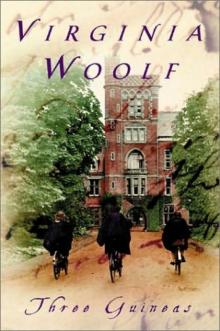 Three Guineas
Three Guineas Flush
Flush Mrs. Dalloway
Mrs. Dalloway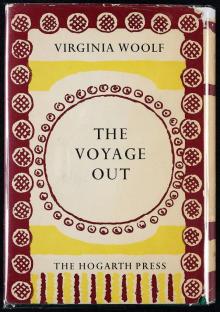 The Voyage Out
The Voyage Out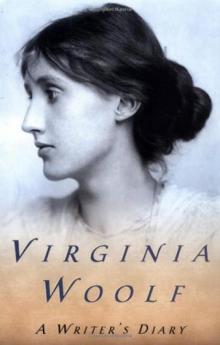 A Writer's Diary: Being Extracts From the Diary of Virginia Woolf
A Writer's Diary: Being Extracts From the Diary of Virginia Woolf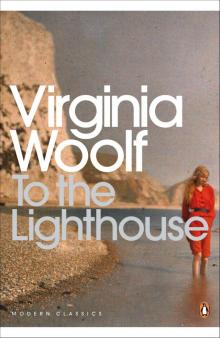 To The Lighthouse
To The Lighthouse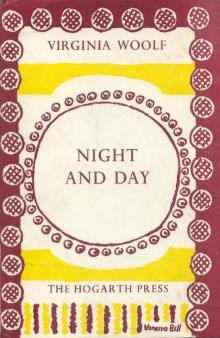 Night and Day
Night and Day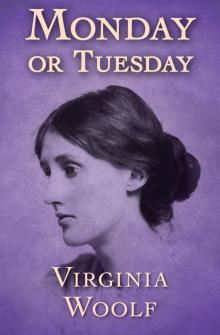 Monday or Tuesday
Monday or Tuesday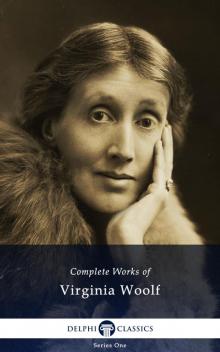 Complete Works of Virginia Woolf
Complete Works of Virginia Woolf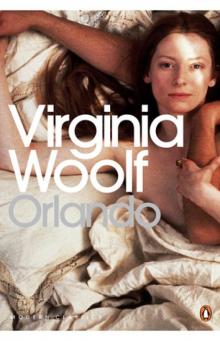 Orlando
Orlando Genius and Ink
Genius and Ink Mrs. Dalloway (Annotated)
Mrs. Dalloway (Annotated) Jacob's Room
Jacob's Room THE RUSSIAN POINT OF VIEW
THE RUSSIAN POINT OF VIEW A Writer's Diary
A Writer's Diary Woolf Short Stories
Woolf Short Stories